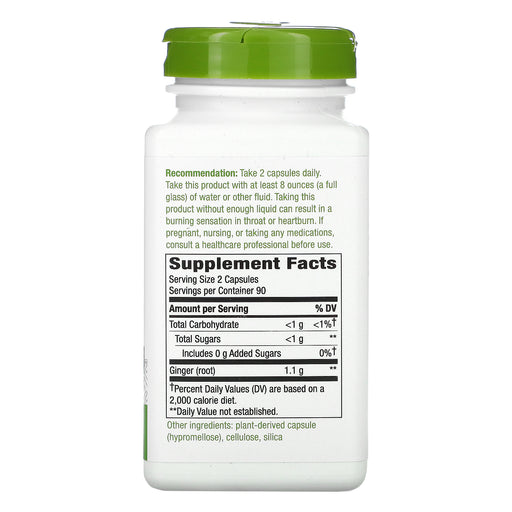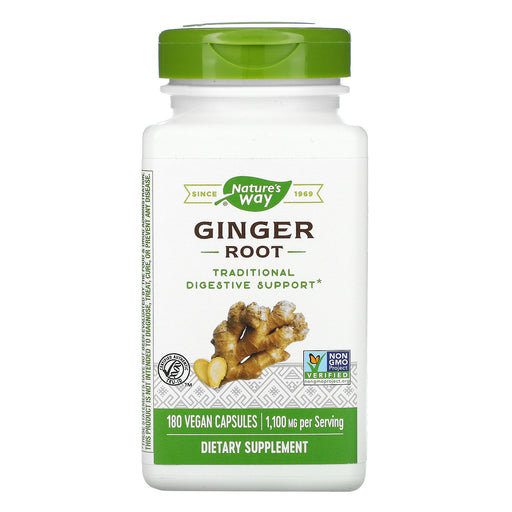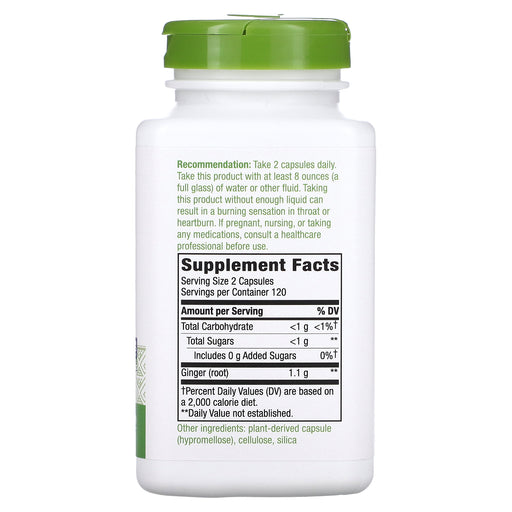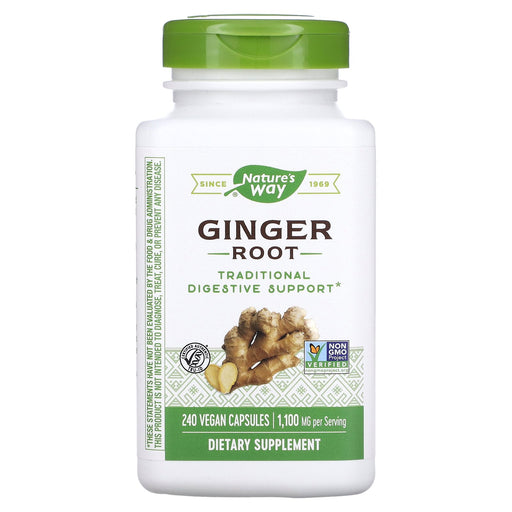
Harnessing the Ancient Wisdom and Modern Science of Ginger Root for Digestive Health and Beyond
Ginger root, scientifically known as Zingiber officinale, has been revered for centuries in traditional medicine systems for its potent health benefits and unique, spicy flavor. This versatile herb contains a wide array of bioactive compounds, including gingerols, shogaols, and zingerone, which work synergistically to support digestive health, reduce inflammation, and promote overall well-being. By incorporating ginger root supplements into your wellness routine, you can tap into the ancient wisdom and modern science behind this powerful botanical and experience its potential benefits for yourself.
The Health Benefits of Ginger Root
Ginger root has been extensively studied for its wide-ranging health benefits, particularly in the areas of digestive health, inflammation management, and immune support. Some of the key potential benefits of ginger root supplementation include:
- Digestive Health Support: Ginger has been traditionally used to alleviate digestive discomfort, including nausea, bloating, and indigestion. The bioactive compounds in ginger, such as gingerols and shogaols, help stimulate digestive enzymes, reduce inflammation in the gut, and promote healthy gut motility. Ginger works synergistically with other digestive-supportive nutrients like probiotics, digestive enzymes, and L-glutamine to promote optimal gut health and comfort.
- Inflammation Management: Ginger contains potent anti-inflammatory compounds that help reduce inflammation throughout the body, including in the joints, muscles, and digestive tract. By modulating key inflammatory pathways, such as COX-2 and NF-κB, ginger may help alleviate symptoms associated with conditions like arthritis, muscle soreness, and inflammatory bowel disease. Combining ginger with other anti-inflammatory nutrients like curcumin, boswellia, and omega-3 fatty acids can provide a comprehensive approach to managing inflammation.
- Immune System Support: Ginger has been shown to possess immune-modulating properties, helping to stimulate the body's natural defenses against harmful pathogens and environmental stressors. The bioactive compounds in ginger, particularly gingerols, have been found to enhance the activity of immune cells like macrophages and natural killer cells, promoting overall immune resilience. Pairing ginger with other immune-supportive nutrients like vitamin C, vitamin D, and zinc can further bolster the body's natural defenses.
- Cardiovascular Health: Some studies suggest that ginger may help support cardiovascular health by promoting healthy blood lipid levels, reducing oxidative stress, and improving endothelial function. The anti-inflammatory and antioxidant properties of ginger may help protect the heart and blood vessels from damage caused by free radicals and chronic inflammation. Ginger can be combined with other heart-healthy nutrients like CoQ10, garlic, and omega-3 fatty acids for a holistic approach to cardiovascular wellness.
- Nausea and Motion Sickness Relief: Ginger has been traditionally used to alleviate symptoms of nausea and motion sickness, thanks to its natural anti-emetic properties. The bioactive compounds in ginger help regulate gut motility and reduce inflammation in the digestive tract, providing relief from nausea and vomiting associated with pregnancy, chemotherapy, and travel. Combining ginger with other nausea-reducing nutrients like vitamin B6 and peppermint can provide targeted support for those prone to these symptoms.
Choosing the Best Ginger Root Supplement
When selecting a ginger root supplement, consider the following factors to ensure you are getting a high-quality, effective product:
- Standardized Gingerol Content: Look for ginger supplements that provide a standardized amount of gingerols, the primary active compounds responsible for ginger's health benefits. A daily dose of 500-1000 mg of ginger extract standardized to 5% gingerols is often recommended for optimal results.
- Quality and Purity: Choose ginger supplements from reputable brands that adhere to strict quality control standards, such as third-party testing for purity and potency, and are manufactured in GMP-certified facilities.
- Supplement Form: Ginger supplements are available in various forms, including capsules, tablets, powders, and tinctures. Consider which form best suits your preferences and lifestyle for optimal compliance and effectiveness.
- Complementary Ingredients: Some ginger supplements may include additional digestive-supportive, anti-inflammatory, or immune-boosting ingredients like turmeric, probiotics, or zinc for a more comprehensive approach to wellness.
- Contraindications and Interactions: If you are taking blood thinners, have a bleeding disorder, or are scheduled for surgery, consult with your healthcare provider before starting a ginger supplement, as ginger may increase the risk of bleeding in some individuals.
Tips for Incorporating Ginger Root Supplements into Your Wellness Routine
To maximize the potential benefits of ginger root supplementation and support overall health, consider the following tips:
- Follow Recommended Dosage: Adhere to the recommended dosage instructions on the product label, typically ranging from 500-1000 mg of ginger extract per day, divided into two to three doses. Start with a lower dose and gradually increase as tolerated, or consult with a healthcare professional for personalized guidance.
- Take with Food: To enhance absorption and reduce the risk of digestive discomfort, take your ginger supplement with a meal or snack.
- Pair with a Balanced Diet: While ginger supplements can provide valuable health support, they should be used in conjunction with a balanced, nutrient-rich diet that includes plenty of fruits, vegetables, whole grains, lean proteins, and healthy fats. Consider incorporating fresh ginger into your meals for added flavor and nutritional benefits.
- Stay Hydrated: Drinking plenty of water throughout the day can help support the absorption and utilization of the beneficial compounds in ginger supplements, as well as promote overall digestive health and well-being.
- Be Patient and Consistent: The effects of ginger supplementation may be cumulative, so be consistent with your supplementation and give your body time to respond and adapt to the potential benefits. Some people may notice results within a few days, while others may require several weeks of consistent use to experience the full range of benefits.
Experience the Power of Ginger Root for Optimal Health and Well-Being with Premium Supplements from Health Orchard
Unleash the ancient wisdom and modern science behind ginger root and support your digestive health, inflammation management, and overall wellness with Health Orchard's curated selection of high-quality ginger supplements. Our collection features standardized extracts with optimal gingerol content, as well as synergistic blends that include complementary digestive-supportive, anti-inflammatory, and immune-boosting ingredients for a holistic approach to well-being.
Experience the versatility and potency of this time-honored botanical and experience the transformative potential of ginger supplementation for yourself. With a focus on quality, purity, and efficacy, Health Orchard is your trusted source for the best ginger root supplements on the market.
Invest in your digestive health, immune resilience, and overall vitality with premium ginger root supplements from Health Orchard. Explore our collection today and take a proactive step towards harnessing the power of nature's most revered herbal remedies for optimal wellness and longevity.
Frequently Asked Questions about Ginger Root
1. Is it safe to take ginger root pills everyday?
Ginger root pills are generally considered safe for most people when taken at recommended doses. However, long-term safety data is limited, and some individuals may experience side effects such as digestive discomfort, heartburn, or mouth irritation. It's essential to consult with a healthcare professional before taking ginger supplements daily, especially if you have pre-existing health conditions, are taking medications, or are pregnant or nursing.
2. What are the benefits of roots with ginger?
Ginger root offers several potential health benefits, including:
- Alleviating digestive issues such as nausea, vomiting, and indigestion
- Reducing inflammation and pain associated with arthritis and muscle soreness
- Supporting immune function and helping to fight off infections
- Promoting healthy blood sugar levels and improving insulin sensitivity
- Providing antioxidant and anti-inflammatory properties that may support overall health and well-being
3. What are the five health benefits of ginger?
Five notable health benefits of ginger include:
- Relieving nausea and vomiting, particularly morning sickness and chemotherapy-induced nausea
- Reducing inflammation and pain associated with osteoarthritis and rheumatoid arthritis
- Supporting digestive health and helping to alleviate indigestion, bloating, and gas
- Boosting immune function and helping to fight off colds and flu
- Promoting healthy blood circulation and potentially lowering the risk of heart disease
4. Is ginger good for the heart and kidneys?
Ginger may offer some potential benefits for heart and kidney health. Its anti-inflammatory and antioxidant properties may help protect the cardiovascular system from oxidative stress and inflammation, which are risk factors for heart disease. Additionally, ginger may help improve blood lipid levels and reduce the risk of blood clots. For kidney health, ginger's diuretic properties may help promote the removal of toxins and excess fluid from the body, supporting kidney function. However, if you have pre-existing heart or kidney conditions, it's essential to consult with a healthcare professional before taking ginger supplements.
5. Who cannot take ginger?
While ginger is generally safe for most people, some individuals should avoid or limit their intake of ginger, including:
- People with bleeding disorders or taking blood-thinning medications, as ginger may increase the risk of bleeding
- Individuals undergoing surgery, as ginger may interfere with blood clotting
- People with gallstones or gallbladder disease, as ginger may stimulate bile production and worsen symptoms
- Those with low blood sugar or taking diabetes medications, as ginger may lower blood sugar levels
- Pregnant women, particularly in high doses, as ginger may increase the risk of miscarriage or other complications
6. Can ginger lower creatinine?
Some studies suggest that ginger may have potential benefits for kidney function and may help lower creatinine levels. Creatinine is a waste product produced by muscle metabolism and is typically filtered out by the kidneys. High creatinine levels may indicate impaired kidney function. Ginger's antioxidant and anti-inflammatory properties may help protect the kidneys from damage and improve their ability to filter waste products like creatinine. However, more research is needed to fully understand the effects of ginger on creatinine levels and kidney function, and it should not be used as a substitute for medical treatment without consulting a healthcare professional.
7. What are the side effects of ginger?
While ginger is generally well-tolerated, some people may experience side effects, especially when consuming high doses or taking ginger supplements. These side effects may include:
- Digestive discomfort, such as heartburn, diarrhea, or stomach upset
- Mouth irritation or burning sensation, particularly with raw ginger or ginger powder
- Increased risk of bleeding, especially in people with bleeding disorders or taking blood-thinning medications
- Interactions with certain medications, such as diabetes drugs or blood pressure medications
- Allergic reactions, although rare, may occur in some individuals
If you experience severe or persistent side effects after consuming ginger, discontinue use and consult with a healthcare professional.












